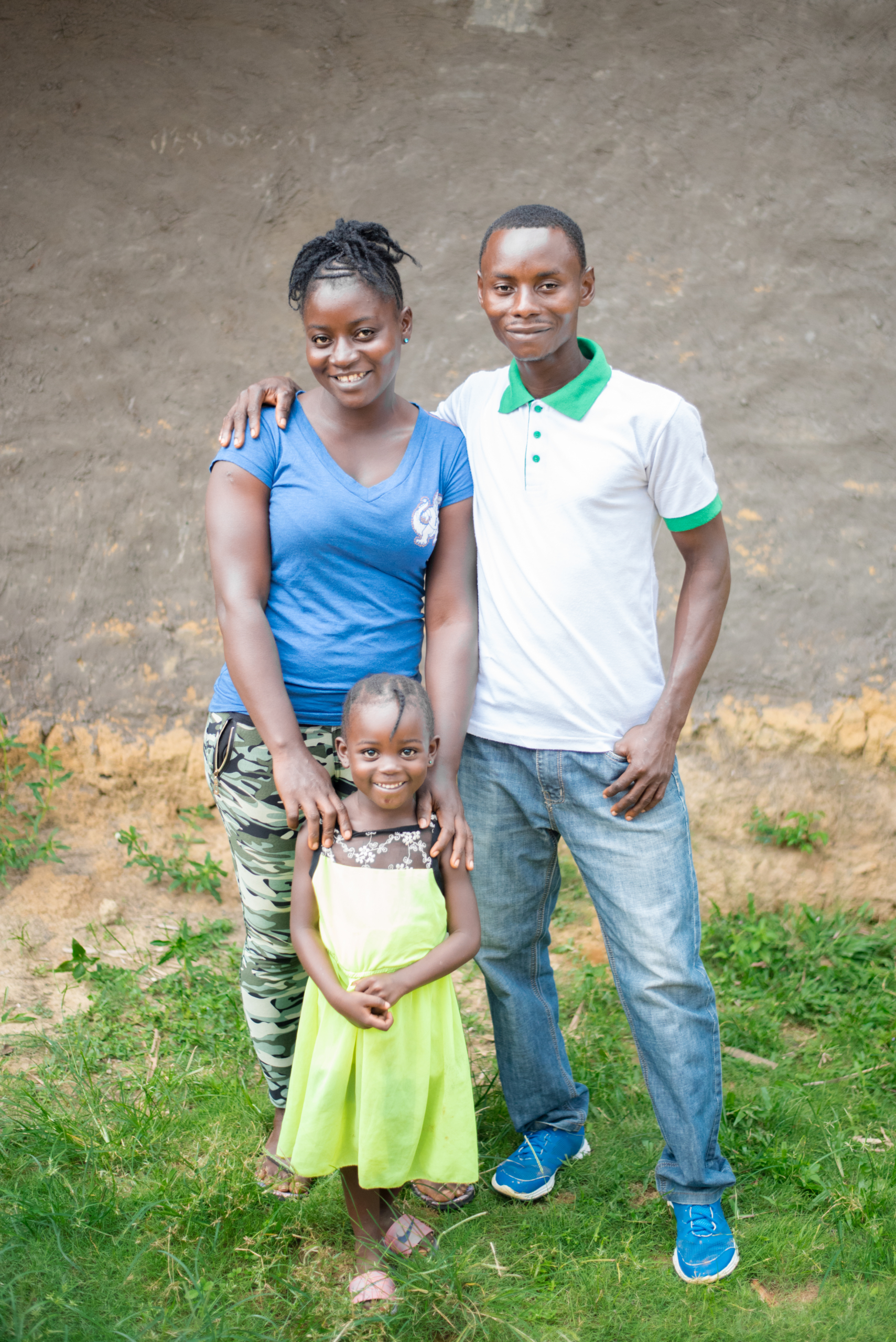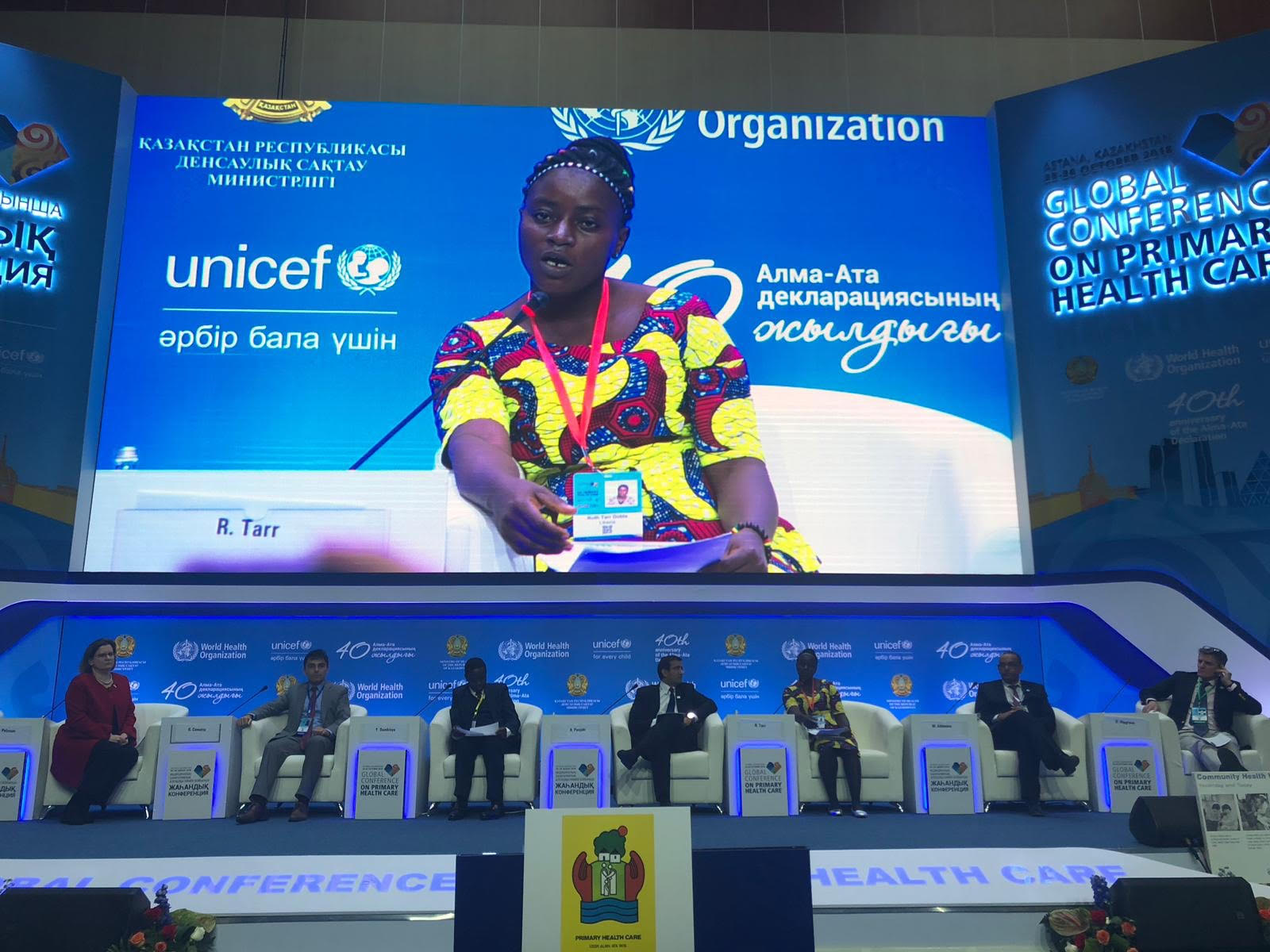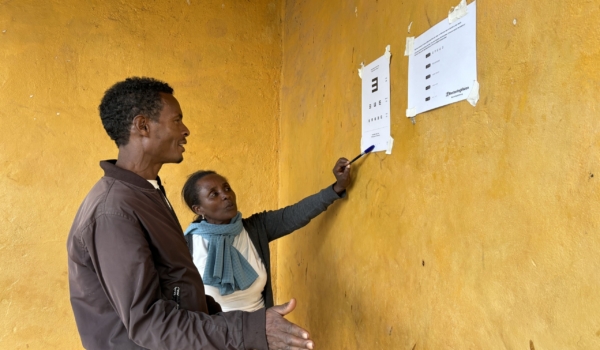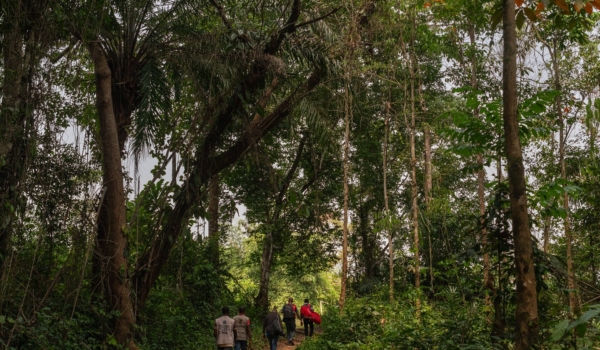Ruth Tarr’s commitment to universal health coverage took her on a journey across continents from a remote community in Rivercess County, Liberia to Astana, Kazakhstan to speak at the historic Global Conference on Primary Healthcare
On a calm day in early October 2018, Ruth Tarr sat with her husband and young daughter on the porch outside their home in Rivercess County, Liberia. As the air thickened with the promise of a rainstorm, neighbors began to emerge over the hill behind the house carrying bundles of newly-harvested rice from their farms in the forest. Soon the air would be filled with rice dust and the steady rhythm of pounding and sifting as the older children joined their parents to de-hull the harvest. Surrounded by the sounds of her neighbors, Ruth prepared for the journey of a lifetime – a journey that was sparked by her passionate determination to build a better life for her community, her family, and herself.
The Global Conference on Primary Healthcare
Two weeks later, Ruth landed in Astana, Kazakhstan to attend the Global Conference on Primary Healthcare and share her story with the world. Much like her quest to become a community health worker (CHW) and further her education, Ruth’s journey to Astana was made especially taxing by the challenges of living in a remote community. From her home in the dense rainforest of Rivercess County, Ruth traveled for more than eight hours over hundreds of miles of unpaved roads to reach Liberia’s capital city, Monrovia. From there, she picked up her newly-minted passport and boarded a plane for the first time in her life to travel nearly three full days through multiple airports to reach Kazakhstan, together with a delegation from the Liberia Ministry of Health and Last Mile Health. Motivated by her intimate familiarity with the experience of hundreds of thousands of Liberians who travel hours to reach the nearest clinic, Ruth was unfazed by the challenges of her travels and arrived determined to share her voice.
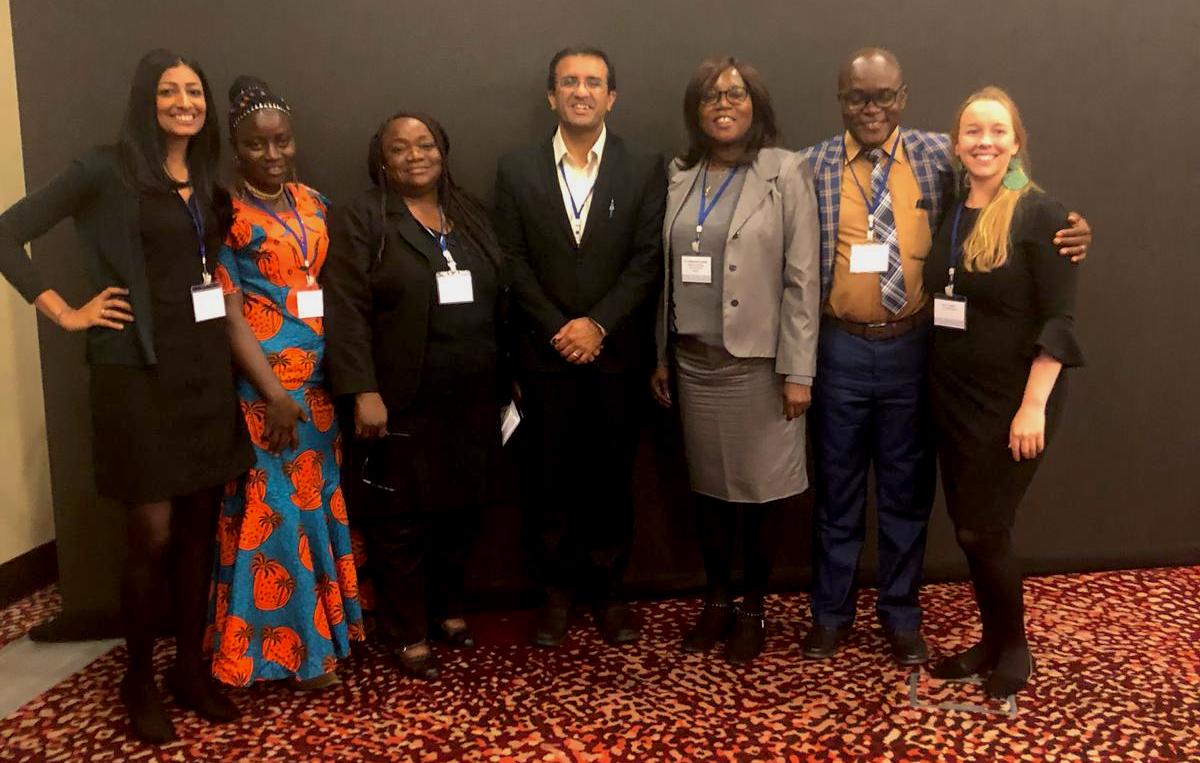
The Last Mile Health and Liberia Ministry of Health delegation at the Global Conference on Primary Healthcare in Astana, Kazakhstan.
Ruth made history when she made the journey from her home in Rivercess to represent CHWs on the global stage in Astana. The conference marked the 40th anniversary of the Declaration of Alma Ata, which marked the first time in history that health was widely recognized as a fundamental human right. During this year’s conference, 1,200 delegates from more than 120 countries renewed this revolutionary commitment to primary health care for everyone, everywhere. To accompany this commitment with actionable resources, the World Health Organization (WHO) used the landmark conference as a platform to launch its first-ever global guidelines for health policy and system support to optimize community health worker programs. The guidelines were developed and informed by a systematic evidence review of CHW programs from all over the world, including the work of Ruth and her fellow CHWs in Liberia.
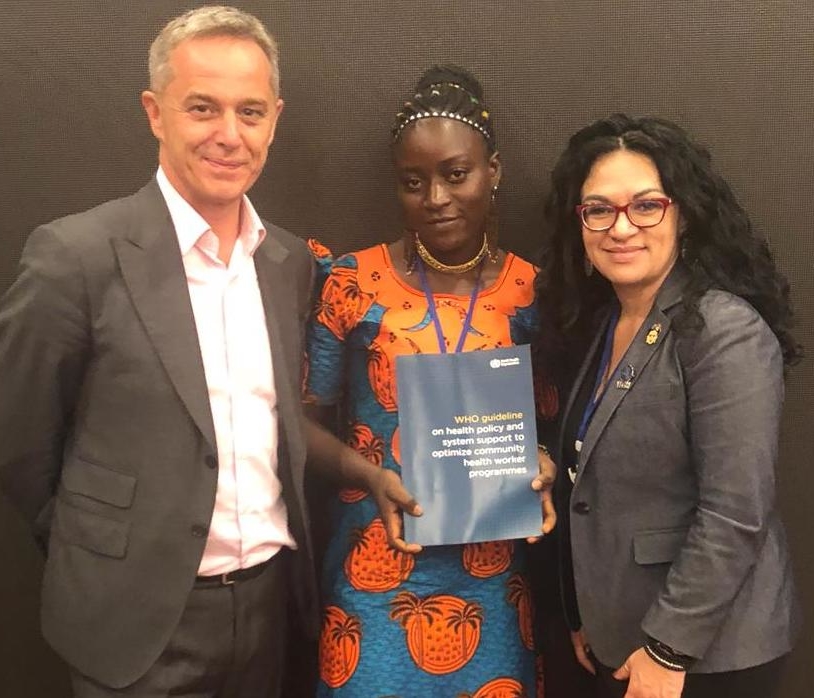
Jim Campbell, Executive Director of the Global Health Workforce Alliance, CHW Ruth Tarr, and CHW Maria of Texas present the newly launched WHO guidelines on CHW programs.
The WHO guidelines provide countries from all over the world with adaptable, evidence-based recommendations for integrating CHW programs into their existing health systems. One of the 15 recommendations is that CHWs should be paid for their work, recognizing their critical role in the health workforce.
At the introduction of the guidelines, Ruth sat on a panel of global experts, including Liberia’s Minister of Health Dr. Wilhelmina Jallah, to address an audience of over 100 policy makers and health systems leaders. Ruth shared her personal story as a testament to the impact of WHO’s recommendations on CHW programs, saying, “The Ministry of Health recognizes the importance of my work and they make sure I am trained, supplied, supervised, and paid.” Recounting how she and her daughter are now both in school thanks to her CHW salary, Ruth underscored the transformative impact of paid employment, explaining:
“Because I am paid, I feel proud and my family and community see the importance of my work and how I am saving for my daughter’s education. I am saving for my education too.”
CHW Programs Not Only Save Lives, but Create Jobs
Ruth’s personal journey as a health worker began when she was an adult student in primary school. Like many Liberians, Ruth’s education was interrupted by economic challenges in the aftermath of the country’s civil war, but she was determined to continue her education despite the obstacles. When she returned to primary school as an adult, Ruth started a girls’ health club to share information on family planning with her schoolmates, many of whom were in their teens and early twenties. Then in 2015, Ruth found an opportunity to further pursue her community’s right to health by joining a community health volunteer program to share health promotion messages with her community. Ruth reiterates that she had “passion for the work” as a community health volunteer, but it was not easy to work on a voluntary basis, especially in the absence of a clinic or professional health worker to manage the community’s significant health needs. Expectations from her community were high, the work consumed time that she could have otherwise used on income-generating activities, and her training didn’t equip her with the skills or tools required to diagnose and treat the illnesses she was educating her neighbors about.
Fortunately for Ruth and hundreds of people like her, the Government of Liberia created the National Community Health Assistant Program as a platform to recruit talented women and men from remote communities, provide them with a monthly salary, empower them with training and supplies to provide health education and diagnose and treat common illnesses in children, and recognize when patients need urgent referral to a health facility. Once the policy was finalized, the Ministry of Health visited Ruth’s community to seek nominations and Ruth was chosen by her community to serve as their CHW.
Over the course of four two-week training sessions, Ruth was equipped with the skills to identify and report potential infectious disease outbreaks, support the health of pregnant women and newborns, diagnose and treat children for diarrhea, malaria, and pneumonia, identify cases of malnutrition, and provide support to people living with HIV/AIDs, tuberculosis, and various other conditions. In addition to a standardized service delivery and training package, the program introduced standardized monthly monetary incentives to recognize CHWs for their work, instituted a clinical supervision structure to provide CHWs with mentorship and clinical coaching, and recognized professional CHWs as an essential component of Liberia’s health system. As one of more than 3,400 CHWs deployed across Liberia to date, Ruth is part of a historic initiative that will provide health care to all 1.2 million people in Liberia who live more than 5 kilometers from a clinic or hospital.
Ruth’s Vision for the Future
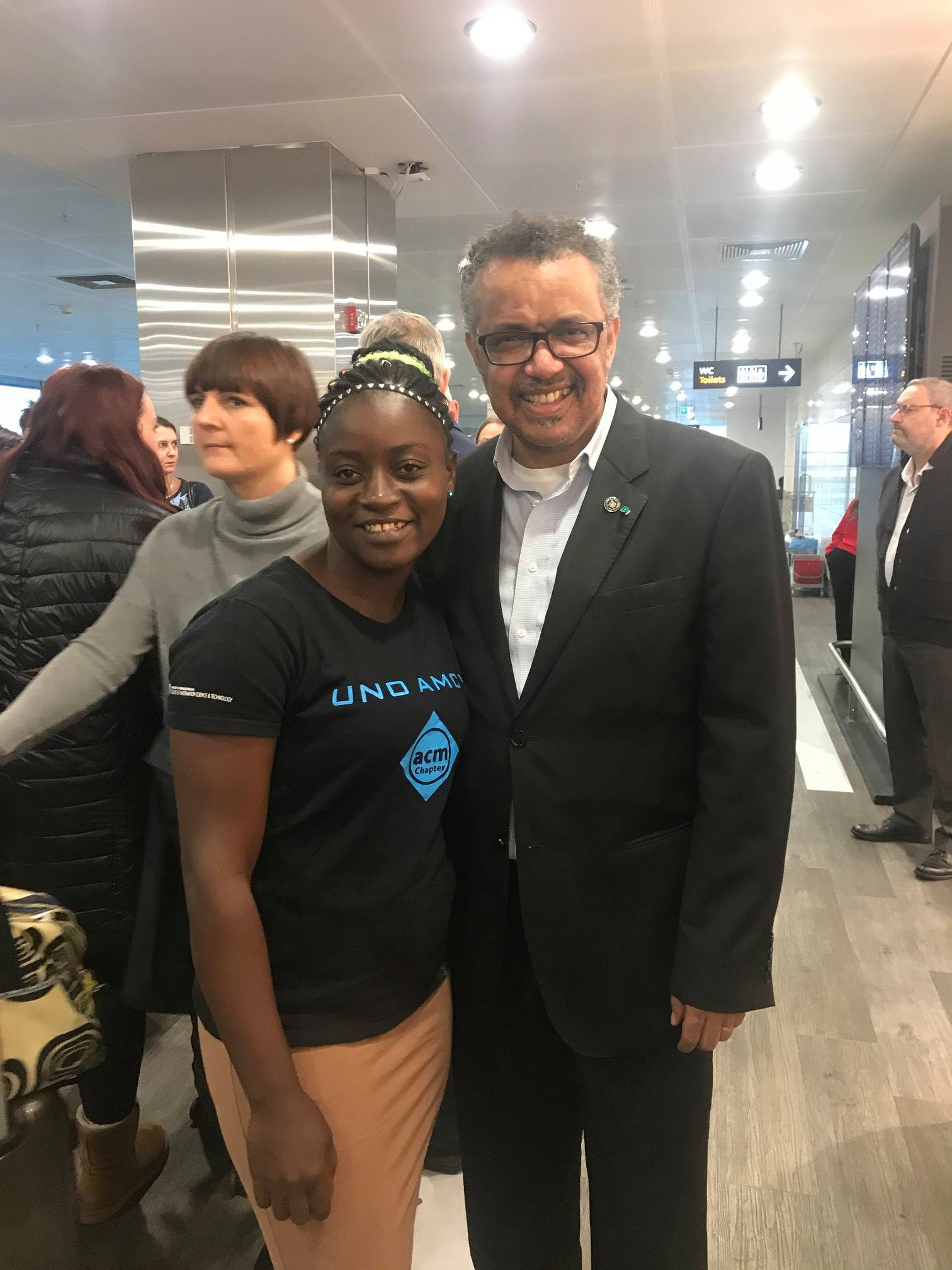
Community Health Worker Ruth Tarr with Dr. Tedros Adhanom Ghebreyesus, Director General of the World Health Organization
Ruth had the opportunity to share her vision for the future with the Director General of the WHO, Dr. Tedros Adhanom Ghebreyesus, of primary health care within reach of every last child and family. She said:
“I have a dream that one day I will finish my education and become a professional nurse. I also have dream for Liberia that the Ministry will work with partners and keep supporting the community health program so that all Liberians have access to health care. Besides, I have a dream that all of you will also take this work to your own country together with the World Health Organization, donors, government and partners. We will extend community and primary health care to all people so that there can be justice in health for all.”

